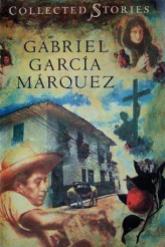“The Third Resignation” (short story) by Gabriel García Márquez
English Publication History: Innocent Eréndira and Other Stories (Harper Row, 1978; Johnathan Cape, 1979), Short Stories (Perennial Library, 1985; Penguin, 1996)
Original: Spanish (1947, La tercera resignación)
Translated by Gregory Rabassa, 1978
Synopsis: As a young boy, he was once had a terrible affliction: death; after his diagnosis, his body’s functions were maintained while his mind sat spinning like flywheel fully alert. Now nearly twenty years later on his twenty-fifth birthday, his body still supine, he is laid like an offering to a morbid god, yet today something is different. Fully an adult in terms in maturation, he begins to putrefy. A second death is coming, one which is difficult to reconcile with: after his second bodily death, is there then a third mental death that he may not be prepared to approach? Or will he hear the nails driven, the soil dug, his flesh eaten by worms?
Analysis: Society loves to celebrate transitions; the more the merrier: baby to toddler to child to tween to teen to young adult to adult; nursery school, to kindergarten, to primary school, to middle school, to high school, to university; first haircut, first Christmas, first birthday, first plane ride, etc. On through to adulthood, our lives are filled with transitions and firsts, but thereafter, we settle into our so-called lives in which we begin to celebrate others’ transitions rather than our own.
As above, age and school are stratified to highlight transitions, but death is one transitions that is black and white: once alive, now dead. As transitions taper off toward our full maturation, our transitional significance to others tapers off, too; though our lives may be filled with effervescent change, society sees our lives as stable, pretty much over the hump of change… the only lingering changes remaining being marriage, over-40, retirement, and death.
In “The Third Resignation”, García Márquez stratifies death in parallel with the stratification of age: child, teen, adult; motor death, body death, mind death. As much as we’re often unprepared to enter the realm and responsibilities of adulthood, the man in the story is scared of what his final transition may entail: Is there life after the transition into adulthood? Is there another kind of life after mind death? Does death become further stratified? Death of ego, death super-ego, death of id.
Review: Morbid yet philosophical, it’s a great combination that exhibits the author’s fascination with death; even more so, it sets the tone for a long history of short fiction that explores the human element in terms of subtle motivation that requires an attentive mind while reading and an attentive mind while reflecting. Just because the 26 stories in the collection are short doesn’t mean that they don’t offer as much as a full-length novel. The stories here are ripe for contemplation, the first of which being “The Third Resignation”.



